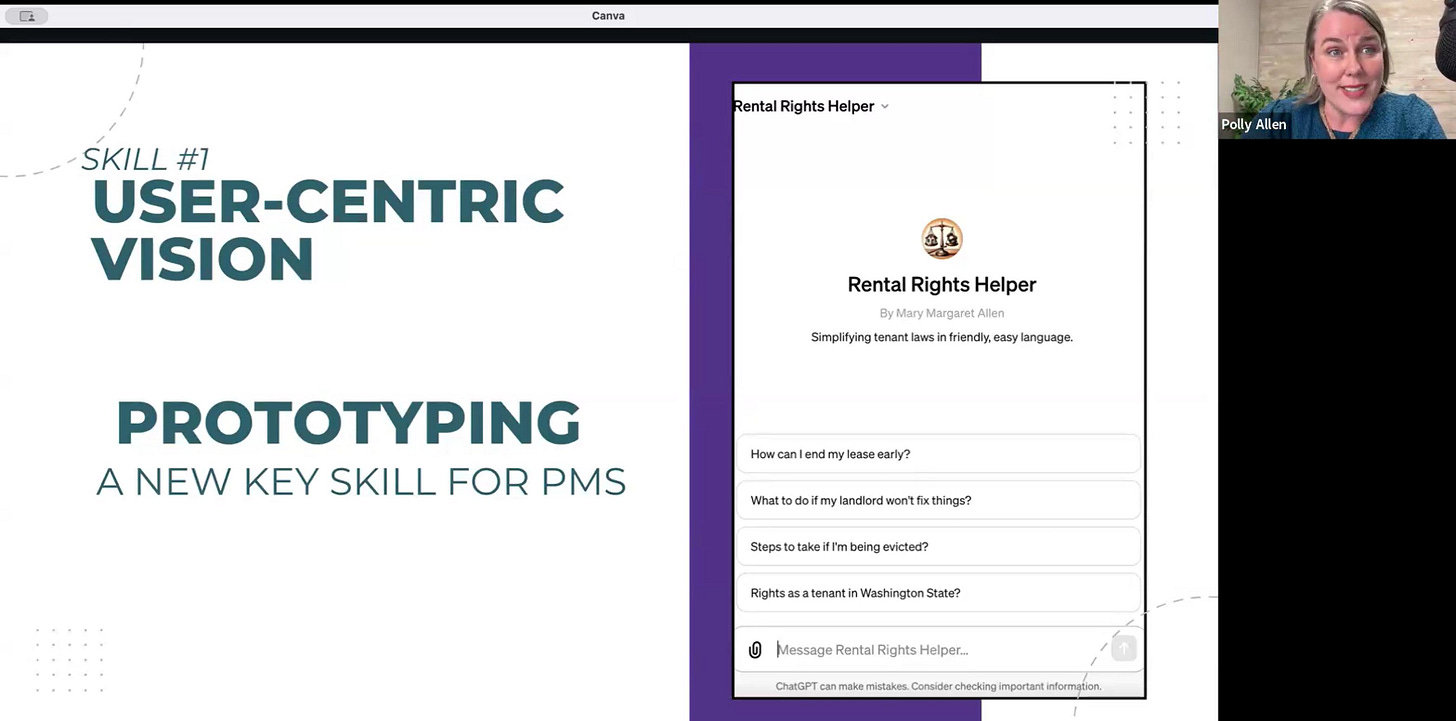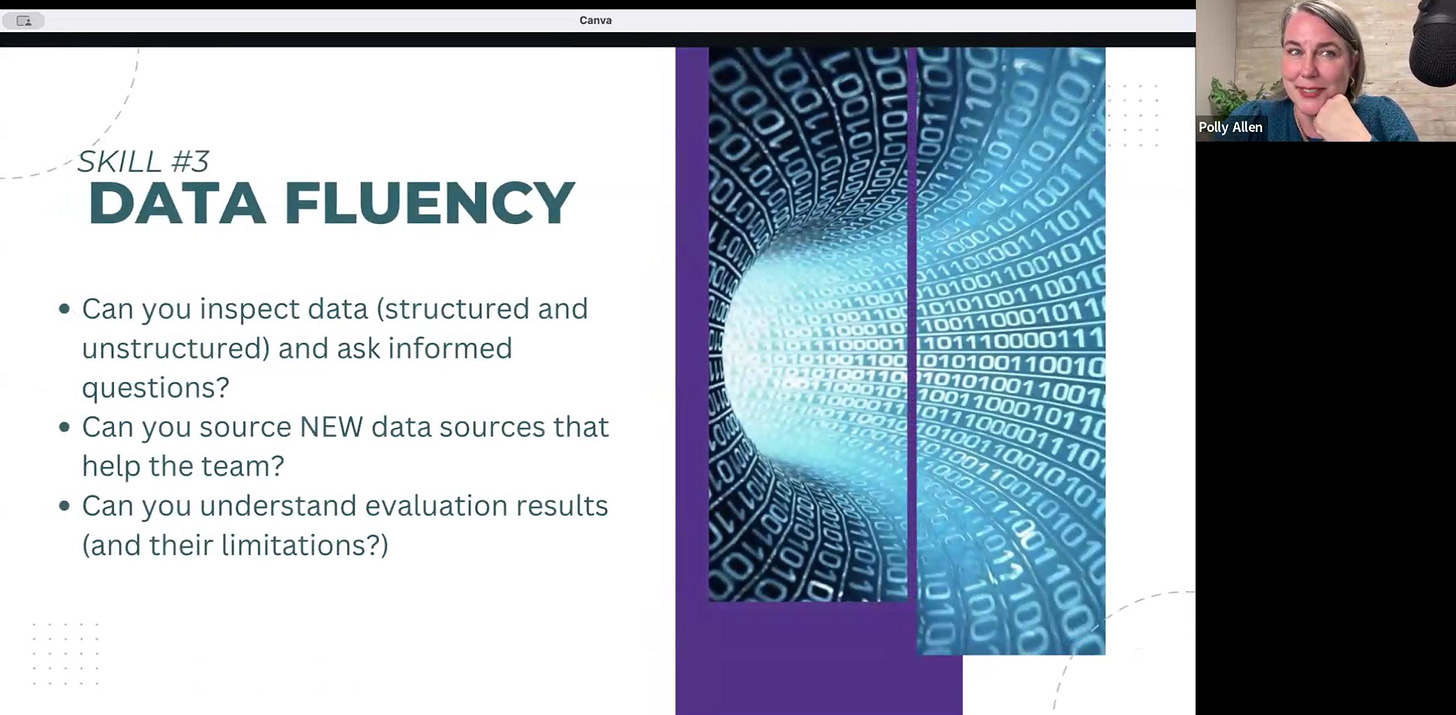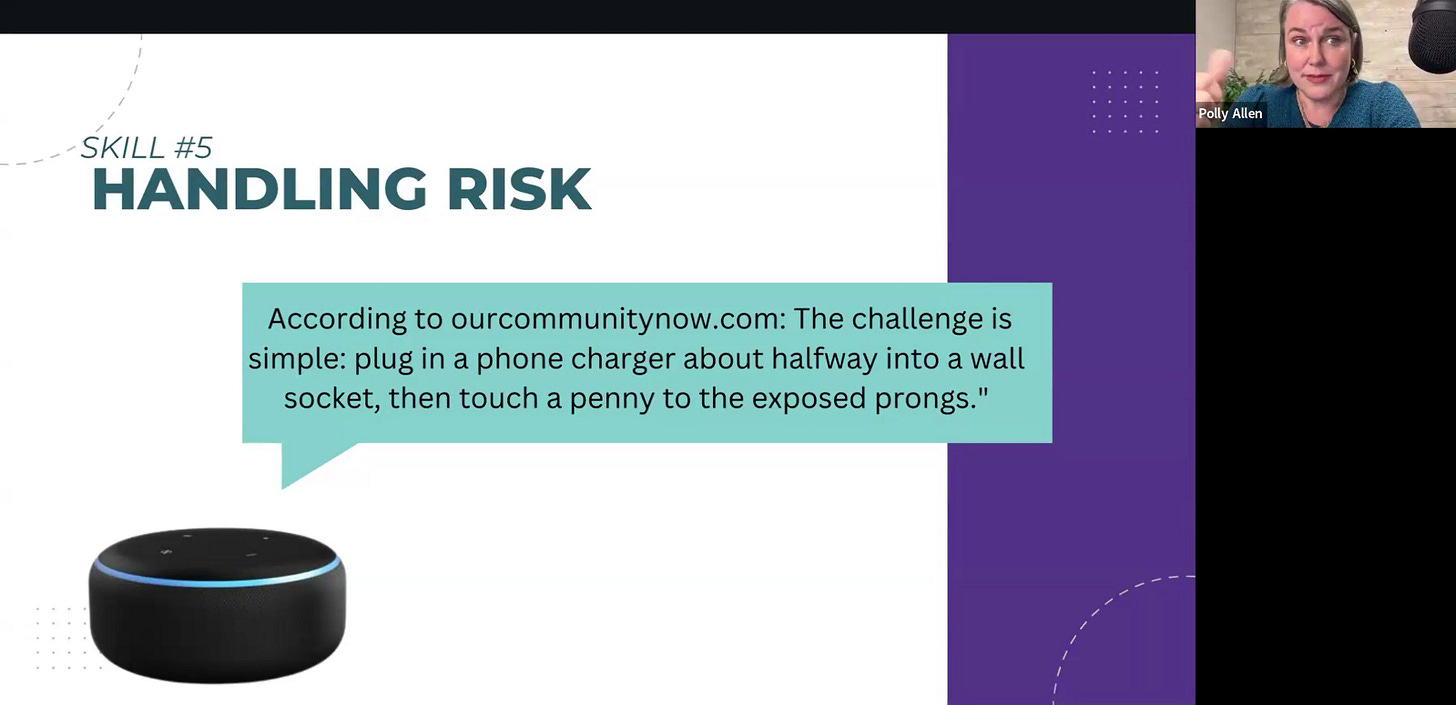💡Product Circle ⭕ Chat - Everyone is Becoming an AI Product Manager with Polly Allen
What happens when AI isn’t just a tool—but the product itself? At 💡 Product Circle ⭕ Chat, Polly Allen shows why everyone is becoming an AI Product Manager—and the 5 essential skills you need to lead
💡Product Circle⭕ Chat runs every second week as a Zoom call that anyone can join to talk all things product, product management and problem solving. Creating value for customers and the business.
Best of all, when you attend live, you receive goodies like free courses and decks (like Janna Bastow provided), a free book (like Rich Mironov, Roman Pichler and others provided), access to their course for free (like John Cutler provided) and many more.
Don’t forget to follow the 💡Product Circle ⭕ Chat calendar on Luma and register for our next talk on 💡 Product Circle ⭕ Chat - Topic: Netflix to Now: Personal Growth, Leadership & Cultures of High-Performance with Sue Bolton on May 21
Become Irreplaceable in 2025
Before we get to Polly’s talk (and recording) below, I’d like to share with you a few great courses I’m running. Both virtually and both based on my 20+ years in Product Management.
Product Commercials Masterclass: Nail the Numbers. Influence with Confidence.
📊 Ever been asked, "What's the ROI?"
Struggled to explain P&L impact, breakeven, or why your product idea deserves investment?
That ends now.
📅 Live | 3 sessions after work | Starts June
🎓 Includes recordings, slides + certificate of completion
In the Product Commercials Masterclass, you’ll master the business side of product—without needing a finance degree. Learn how to:
✅ Decode the language of execs: P&L, ROI, breakeven, NPV and more
✅ Confidently build commercials to support your business case
✅ Model revenue, costs, and unit economics that make sense
✅ Forecast outcomes, stress-test assumptions, and spot risks early
✅ Build better buy-in with stakeholders using numbers they trust
✅ Influence investment decisions with clarity, not spreadsheets
Whether you're a PM pitching an idea, a Product Leader in boardrooms, or stepping into more commercial responsibility—this is your playbook.
💡 Great product ideas don’t just speak for themselves. You need the numbers to back them.
🎟 Reserve your spot and level up your commercial game.
👋I’m Irene Liakos. A product management and growth expert with over 2 decades of experience growing product profitably across Telco, Banking, Fintech, AI, Data, Travel, Ecommerce and more. I teach, coach and advise product managers and business leaders. Reach out to me if your products aren’t delivering the value you need. You can contact me at irene@phronesisadvisory.com
Now don’t miss an article, make sure you subscribe!
Let’s get back to Polly’s talk.
This 💡Product Circle⭕ Chat was run on the 8 May 2025 at 9am (AEST) with Polly Allen
Recording below👇🏼
🤯You’re already an AI Product Manager
Let's be honest—the world of product management is changing at breakneck speed. If you're still thinking AI is something "the tech team handles," I've got news for you. We're all becoming AI product managers now, whether we've signed up for it or not.
The Workplace Shake-up That's Already Happening
Polly Allen, who founded AI Career Boost and previously led teams for Amazon's AI Alexa, didn't mince words about what's happening: AI isn't just another tech fad—it's driving one of the biggest workforce changes we'll see in our lifetime.
Sure, there's plenty of hype around AI (those trillion-dollar revenue projections, anyone?). But beneath the buzz, real money is flowing and real adoption is happening. Companies are genuinely transforming, and we're seeing these lean, mean "AI-first" organisations pop up with ridiculous speed-to-revenue ratios and tiny staff numbers.
The good news?
Product management isn't dying—it's absolutely booming, just in ways we mightn't have expected.
"Is it dying? I would argue, no, it's definitely it's exploding" - Polly Allen
From Generative to Agentic: The Next Big Wave
While everyone's still getting their heads around generative AI, there's already another wave building: agentic AI. Google Trends data from North America and Australia shows interest in AI agents potentially overtaking generative AI in discussions about important technologies.
So what exactly is agentic AI? Polly frames it as existing on a spectrum. The more agentic a system is, the more you give it a goal rather than explicit instructions. These systems often have enhanced capabilities:
Access to external APIs or tools
Memory systems
Knowledge bases
The real kicker is that higher agentic systems can tackle higher-value use cases. Instead of just summarising an email, they might actually manage your entire inbox. Despite the challenges, there's genuine potential here—especially in areas like coding—for these systems to replace human work entirely.
Investment in this space isn't small potatoes either. At minimum, companies are automating internal processes. At maximum, they're building full agentic systems for both internal teams and customers.
🤖 Product Management: Now with Extra AI
The job market is flipping on its head. While everyone was obsessing over hiring data scientists, something interesting happened—AI Product Manager roles have started to dramatically outpace technical positions in many organisations.
This shift means we're all wearing more hats than before. We need a bit more technical depth, but our core superpower—our relentless focus on customers and value—is more crucial than ever.
As Polly put it during the session, in this world where the cost of building with AI is falling, , knowing what to build has become the real money skill.
Drawing on Andrew Ng's newsletter "The Batch," Polly highlighted a crucial insight: "As the cost of building AI is falling, actually the skill and the thing where it'll be, the demand is, know what to build right, knowing what to build."
In other words, as building becomes cheaper and faster, the real value lies in identifying worthy problems and defining what needs to be built. This applies not just to customer-facing products but also to internal tools across departments like HR, sales, and customer service.
Getting Into the Nitty-Gritty of Evaluations
One aspect that deserves special attention is how we evaluate AI systems. In the traditional software world, we could usually point to clear right and wrong answers. With AI, results can be "non-deterministic" and often lack a single correct answer.
Polly shared her experience evaluating Alexa news summaries, where simple "correctness" wasn't enough. Defining acceptable error levels meant diving into human performance benchmarks and journalistic guidelines.
The product team's critical role was creating a "rubric" so well-defined it could be consistently applied, even by non-experts or eventually by other LLMs. As Polly stated, "the only ones who have that idea of how acceptable or unacceptable an answer is... are the PMs."
A fascinating example came up around sports results. What might be perceived as errors when reporting US NFL results in Australia demonstrated how context drastically impacts evaluation criteria, requiring constant revisiting of guidelines.
Best practices for evaluations include:
Providing numerous examples
Testing with multiple models
Cross-checking with human evaluation periodically
💡 Five Skills You Need for This New Reality
1. Proper Prototyping, Not Just Pretty Pictures
Remember spending weeks on wireframes that never saw the light of day? That's becoming a thing of the past. Today's AI tools let us build and test functional prototypes ridiculously quickly, often without begging the dev team for help.
Polly shared real examples from her course: a renter rights helper built as a Custom GPT in just 15 minutes for early feedback, and Tasteflow, an app for extracting and personalising online recipes, built in eight weeks using no-code tools.
This means we can try ideas, see them fail, and pivot without massive investment.
It's product management on steroids—build fast, learn fast, and move on when something's not working.
2. Master AI Core Concepts: Getting Your Head Around AI Basics
No, you don't need to become a machine learning engineer overnight. But you do need to understand how AI actually works—its strengths, its many limitations, how systems are built and evaluated, what drives costs up, and basic architectural patterns.
Polly recommends learning the essentials like effective prompting, fine-tuning, and that mouthful known as Retrieval Augmented Generation (RAG). Keep an eye on emerging concepts like agentic AI patterns too.
A practical tip: start using AI tools to manage your own work.
Try using Claude as your task manager—there's no substitute for hands-on experience.
3. Data Fluency: Getting Clever with Data
Let's face it—most organisations are a mess when it comes to data. Wrong formats, poor governance, inconsistent labelling... it's chaos out there.
As product people, we need to get comfortable navigating this mess.
The trickiest bit?
Understanding evaluation results in a world where AI outputs aren't consistent and often don't have a single "right" answer. Product teams need to translate technical metrics into outcomes that actually matter for users and the business.
Polly shared her experience with evaluating Alexa's news summaries.
Simple "correctness" wasn't enough—they needed nuanced evaluation systems that balanced accuracy with user expectations and business goals, preventing embarrassing situations like insensitive clickbait headlines slipping through.
4. Thinking Like an Engineer (Without Becoming One)
You don't need a computer science degree or coding chops. What you do need is an engineering mindset and the ability to chat with technical teams without glazing over.
According to Polly, hiring managers want product people who can meaningfully participate in engineering discussions. It's a skill you can develop through close collaboration and genuine curiosity about how your product works under the bonnet.
5. Risk: Getting Smart About New Kinds of Risk
AI brings entirely new flavours of risk. Beyond the legal stuff, there's the fundamental unpredictability of these systems.
Polly shared an example where Alexa suggested a child try the dangerous "penny challenge" mentioned in a news article. The team had spotted the risk category but hadn't fully grasped how serious it could be.
Smart risk management means having honest conversations with leadership about what could go wrong and having clear plans for when (not if) things go pear-shaped. This includes kill switches to quickly remove problematic outputs and involving customer service in keeping an eye on system behaviour.
Gone are the days when we could expect software to behave perfectly.
As product leaders, we need to help our organisations build responsible AI systems that minimise harm.
Leading Through the Change
Bringing AI into an organisation isn't just a technical challenge—it's a massive change management exercise. It means educating teams, building awareness, celebrating wins, and helping people understand both the opportunities and the pitfalls.
Polly referenced Shopify's CEO memo as a "pretty good masterclass" in managing drastic change (even if some found aspects of it harsh). Clear communication about how AI is changing the business, setting expectations, providing examples of use, and measuring adoption are all critical components.
The key insight? Helping employees understand that while AI might feel like an existential threat to their jobs, not adopting AI could be an even bigger threat to their careers and the organisation.
As product people, we're perfectly placed for this role because we already focus on the human side of technology adoption.
The writing's on the wall: product management and AI are now joined at the hip.
“Product leadership is evolving to not just leading people, but leading these cyborg hybrid teams” - Polly Allen
Watch the video to learn more 👇
TL;DR
AI isn't just hype—it's backed by trillion-dollar projections and fundamentally changing business models with "AI 1st companies" achieving high revenue with smaller teams.
We're already moving from generative AI to agentic AI, where systems are given goals rather than instructions and can handle increasingly complex tasks.
Product management isn't dying—it's exploding, with AI PM roles now outnumbering data science positions.
As building gets cheaper and faster, the real value is in knowing what to build. This makes product skills more crucial than ever.
Evaluating AI systems requires new approaches since results are often non-deterministic without clear right/wrong answers. Creating well-defined evaluation rubrics is a key product skill.
Implementing AI is as much about human change management as technical implementation. Helping teams understand both opportunities and risks is crucial.
The AI product manager's role combines technical intuition with traditional product skills like problem identification, responsible system building, change leadership, and risk management.
The bottom line? We're not just becoming AI product managers—we're becoming more strategic, more technical, and more valuable than ever before.
Product Circle Chat 44 - Topic
Topic: Everyone Is Becoming an AI Product Manager
It’s not just product managers who need to understand AI.
In 2025, every professional — from coaches to founders to operators — is making decisions about AI-powered systems: what to build, what to automate, and what the risks are. Like it or not, they’re taking on the responsibilities of AI product management.
In this practical session, Polly Allen (former Amazon Alexa product leader and founder of AI Career Boost) challenges how we think about “AI PMs” and shares why traditional product mindsets are failing to keep up.
She took us through:
🤖 Why using AI tools is no longer enough — and what building with AI really demands
🤖 How to spot high-leverage, high-ROI opportunities in an AI-saturated world
🤖 Why most orgs are dangerously overconfident about their AI readiness (think prompt engineering or chatbots)
🤖 What the rise of intelligent agents means for your product surface, roadmap, and role
This isn’t about prompt engineering. It’s about reimagining your role as a product leader when AI is no longer just a tool — it’s the system.
🔹 How the best tech companies create truly loved products
🔹 The Delight Grid—a step-by-step method for designing joy
🔹 How to go beyond the "nice-to-have" mindset and make delight a core product strategy
🔹 Real-world examples of how Google, Spotify, and Microsoft build unforgettable experiences
Product Circle Chat 44 - Video
Product Circle Chat 44 - Speaker
Polly Allen is a trailblazer in AI product innovation and one of the most respected voices at the intersection of artificial intelligence, product leadership, and ethical tech.
A former Amazon Alexa product leader, Polly was responsible for shaping the capabilities of the world’s most popular speech assistant—building teams, launching features used by millions, and making AI more helpful and human.
She’s the founder of AI Career Boost, host of the AI Product Leader Podcast, and part of the Futurist Think Tank, where she helps organisations and individuals prepare for what’s next in AI. Polly is passionate about inclusive innovation, ethical AI, and empowering more women to lead in the tech space.
Polly holds degrees in both Computer Science and Business, combining deep technical expertise with strategic thinking. She’s worked across startups, enterprise, and government, and taught AI product strategy at Reforge.
Links:
🔗 Polly Allen on LinkedIn
🌐 AI Career Boost
🎙️ AI Product Leader Podcast
Product Circle Chat - Q&A
❓ How do I get involved?
1. Subscribe to the Product Circle Chat Calendar on Lu.ma and get notified of every 💡 Product Circle ⭕ Chat event
2.Register & Show up - Register to the Product Circle Chat event, block your calendar out and come to the next Chat 📅
3. Share - bring a friend or two who wants to talk all things Product 👯♂️👯♀️
4. Volunteer - volunteer to host or present at one of the future Product Circle Chats 🙋♀️. Drop me an email at irene@phronesisadvisory.com
❓ Will there be more sessions?
Yes. Fortnightly. Every second week.
❓ What if I can’t make the next session or don’t want to miss the next Product Circle chat invite?
Really want to come to the session but 😭 can't make this specific 💡 Product Circle ⭕ Chat?
📆 Get an invite directly into your inbox
👉 Subscribe to the Product Circle Chat Calendar on Lu.ma and get notified of every 💡 Product Circle ⭕ Chat event
💪 We've got you!
❓ Still have Questions?
Talk to me. Send me an email at irene@phronesisadvisory.com
Are you new to Product Management and want to learn from me?
I created a Course. For people new to Product Management.
Aligned it with the Learning Outcomes created by Product greats like Jeff Patton and others. Had it certified by the globally recognised ICAgile.
Choose to spend 2 days learning from me - either face to face or via Zoom - with ICAgile Certified Professional in Product Management (ICP-PDM).
And if you’re looking for a sneaky discount, send me an email at irene@phronesisadvisory.com









